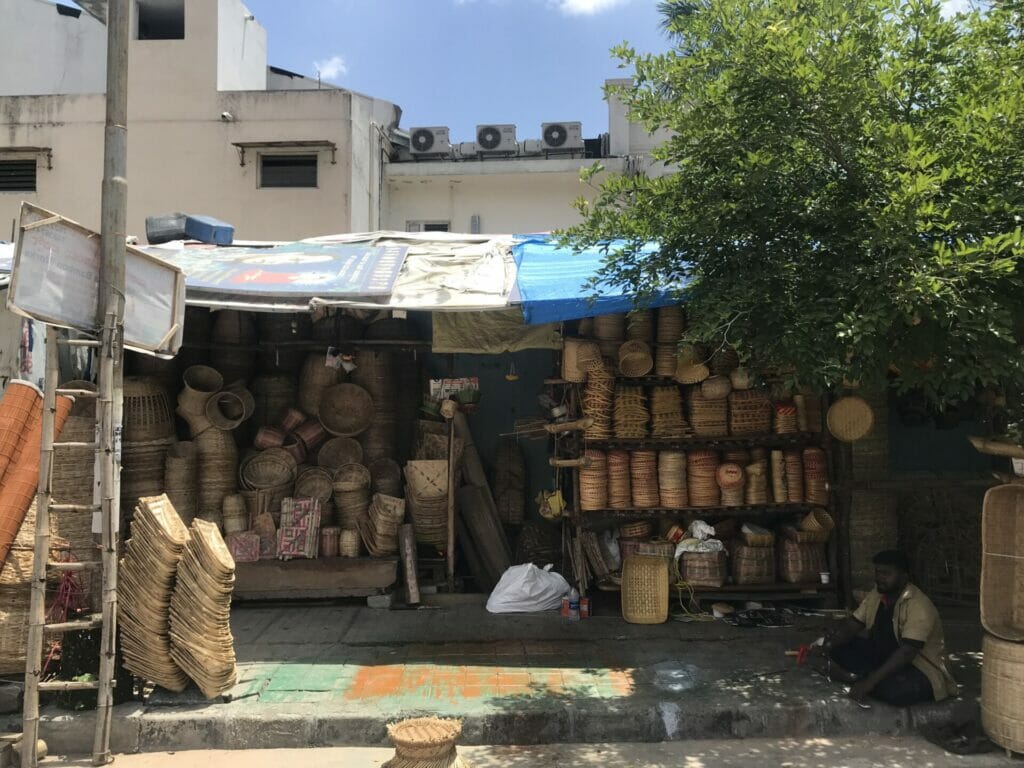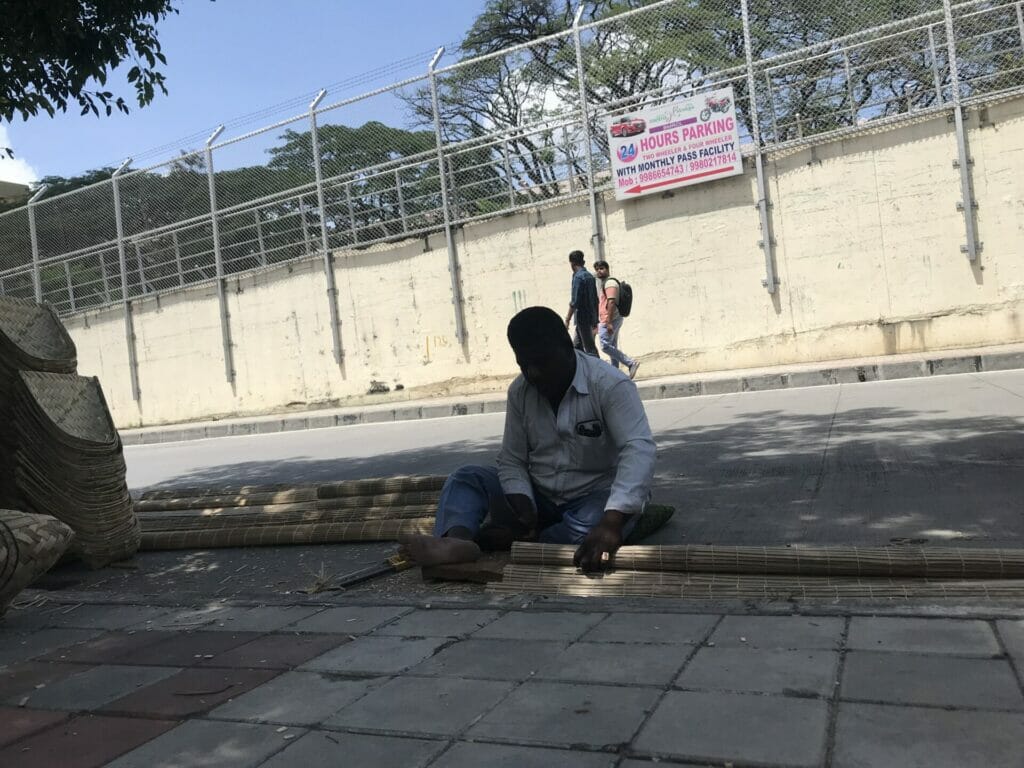Mariamma, a 71-year-old weaver of bamboo baskets, sits on the footpath of K R Road, applying ointment to the wounds on her hands, hoping someone would buy the baskets she had woven four days ago.
Weaving baskets has been Mariamma’s livelihood for the past 58 years. “I started weaving baskets at the age of 11 when I was a newlywed,” says Mariamma. “I have been doing it alone since 1984 after my husband passed away. Although this is our traditional occupation, we cannot afford to do this anymore, hence I did not let my children take up this profession.”
This long stretch of K R road, next to Theological Society, is home to basket weavers. The colourful baskets are displayed on the footpath to catch the attention of passersby, but it is not enough to attract potential buyers.
Around five years ago, there were more than 15 weavers here, but the numbers have steadily declined to just a handful today. All of whom are struggling to make ends meet and are on the look out for other sources of income.
The weavers belong to the Medara community, hailing from different parts of Bengaluru, Mysuru, and Srirangpatna. They have been weaving and selling baskets in the same spot for decades, now.
‘Emotional bond’
“I am the third generation to take this up,” says Mahadeva, a weaver, sitting in the scorching heat. “But this profession will never satisfy our wants and aspirations I have no hope that someday business will get better. So I also drive an auto rickshaw while my mother works as a domestic worker,” he says.
“Bamboo is an essential requirement, from cribs to bier,” adds Mahadeva. “We also weave bamboo mats, flower baskets and vegetable baskets. But with an evolving lifestyle, nobody buys it anymore. Weaving is not just a profession for us, we have an emotional bond to this profession that we cannot let go of.”
Read more: For paanwalas of Bengaluru, bribes and eviction threats a constant reality
The weavers import bamboo from Belgaum through middlemen every three months. It costs them approximately Rs 300 per kg. The average business here is about Rs 500 per day, out of which around Rs 300 is used to buy raw materials and other necessities. It takes at least two hours to weave a basket. The weavers cannot choose the kind of bamboo they want. They use sharp knives to slice the bamboo first into thinner strands, which they weave horizontally, and then use the thicker and stronger threads for vertical support.

No longer viable
Nagu, a weaver who took up her family’s tradition, says: “I learnt weaving at an early age because of my parents and grandparents. We do not have a good profit margin and there are days where we do not sell even one basket. On a good day, we sell around three to four baskets. This business has been like this for a very long time and that is the reason many weavers have gone back to their native places. Also, people bargain a lot, but we are unable to sell the baskets at a discount as we do not make a profit margin. Now that the rainy season is starting, our lives are going to get tougher. The bamboo turns black when exposed to rain, which makes it difficult for us to sell the baskets.”
“I have three daughters and I wanted the struggle to end with me,” adds Nagu. “So, even though it was tough, I kept them in school. I want them to be educated and do something with their lives unlike us struggling for every penny”.
Customers’ perspective
Dhanalakshmi was one of the very few customers I spoke with. She was buying a basket for a ritual. “I am 60-years-old and with new products in the market, I hardly buy any bamboo products,” says Dhanalakshmi. “So, I cannot expect the next generation in my family to buy these baskets.”
People are buying these bamboo baskets only to keep up with their cultural traditions, but this is not enough for the weavers to earn a good livelihood. “During Gowri-Ganesha festival we do a little better,” says Basavraja, a weaver. “The pooja bhandari stores buy from us if they can finish up their stocks. Otherwise, we cannot expect that either.”

The pandemic effect
Basavraja adds: “Even during the pandemic, we stayed on the footpath from morning till night. We did not make any baskets because no one was buying them. The police also forced us to leave. A lot of common people and philanthropists helped us get through the pandemic by providing us food, water and beverages, everyday until the lockdown ended.”
Help from the government
“The government so far has in no way or form helped us, so far,” said Basavrajas’s wife, also a weaver. “The recent schemes announced by the Congress government will not be a great help to us as the government is asking us for more documents than we possess. About the electricity waiver, when they come to check we will not be available as we are on the footpath all day long. We hope we can find a way to avail it”.
Good old days
Earlier, rectangular baskets were used in the traditions associated with the postpartum. The benzoin raisin (sambrani) is lit inside the basket to dry the hair of new mothers and keeps the newborn baby warm. The newborns were put to sleep in the basket, before being put in cotton cots, as people believed the babies would sleep better.
Other than traditional purposes, the baskets were used in the farms to keep hens from getting out. The same baskets were also used by the fruits and vegetable vendors as they are sturdy enough to withstand the weight. The fancy baskets were also used in bouquets.
Read more: No fortunes in selling fish in the city, but a livelihood for many
The basket weavers also sold bamboo fans and bamboo mats, which helped in staying cool in the hot summers and it was common to find it in most houses in Bengaluru. The bamboo mats were also used to sit on and perform poojas.
The weavers enjoyed a good time before technology and the use of plastic.
With so many people discontinuing this profession, bamboo weaving in the city will soon become history. We need to keep such traditional professions alive not only for the sake of heritage, but also to protect the environment, by choosing bamboo products over plastic. If the struggles continue for a few years, we do not know if we will ever see these baskets on K R Road again.